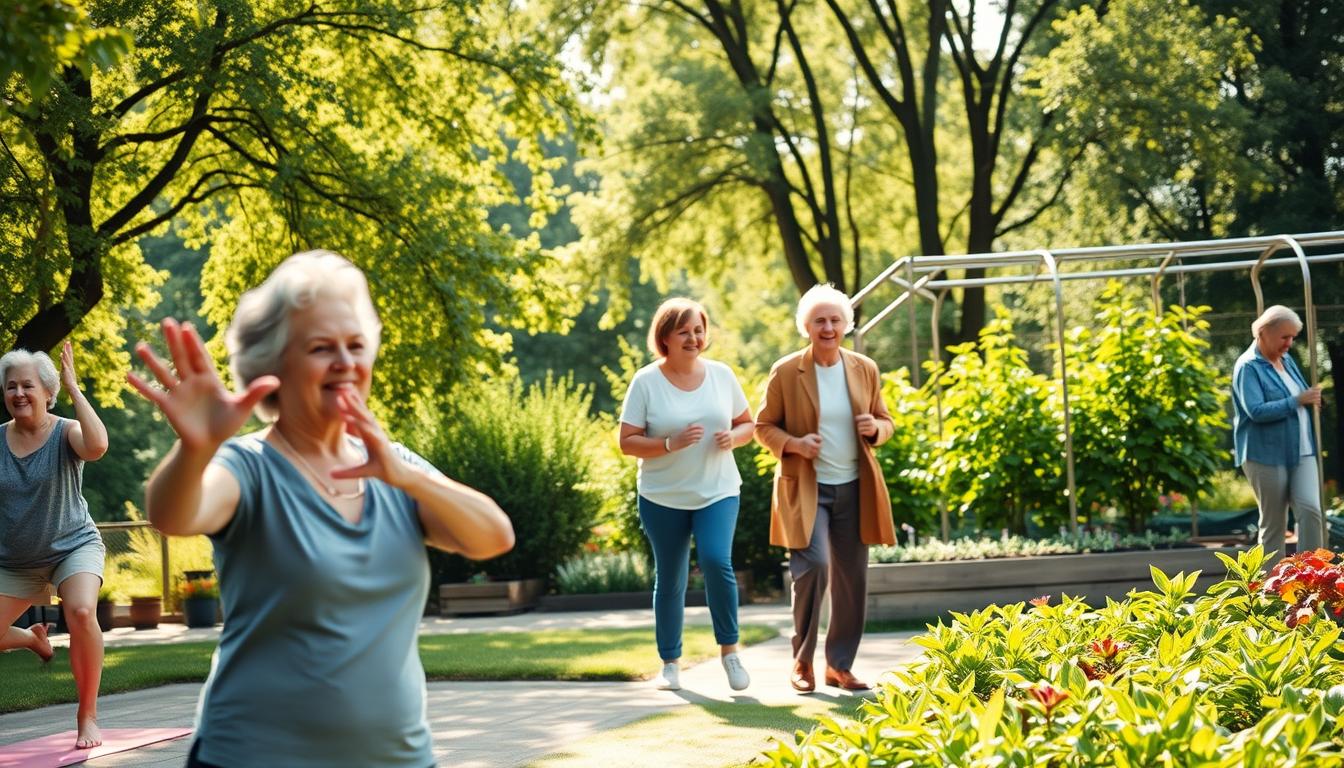A shocking 9.7% of the global population is aged 65 and older, and this number is projected to rise to 16.4% by 2050, according to the World Health Organization.
Aging is an inevitable process, but adopting healthy lifestyle practices can significantly impact how we age. Simple changes to our daily routines can help us stay younger and more vibrant.
By incorporating simple and effective habits into our daily lives, we can potentially slow down biological aging and improve our overall well-being.
Key Takeaways
- Simple daily changes can impact biological aging.
- A healthy lifestyle is crucial for aging gracefully.
- Effective habits can improve overall well-being.
- Adopting healthy practices can slow down aging.
- Daily routines play a significant role in aging.
Understanding Biological Aging vs. Chronological Aging
Aging is not just about the number of candles on our birthday cake; it’s about how our bodies age biologically. While chronological age is measured by the number of years we’ve lived, biological aging reflects how well our bodies function. Understanding the difference between these two types of aging is crucial for adopting anti-aging lifestyle habits that can help us slow down the aging process naturally.
What Is Biological Aging?
Biological aging refers to the physiological changes that occur as we age, affecting our body’s functionality and overall health. It’s influenced by a combination of genetic, environmental, and lifestyle factors. Unlike chronological aging, which is inevitable, biological aging can be influenced by our choices and habits.
Factors such as diet, physical activity, stress levels, and exposure to toxins can accelerate or slow down biological aging. For instance, a diet rich in antioxidants and anti-inflammatory foods can help mitigate the effects of aging, while a sedentary lifestyle can accelerate it.

How Lifestyle Affects Your Biological Age
Lifestyle choices play a significant role in determining our biological age. Engaging in regular physical activity, maintaining a balanced diet, managing stress, and getting adequate sleep are some of the key habits that can help slow down the aging process naturally.
| Lifestyle Factor | Impact on Biological Aging | Beneficial Habits |
|---|---|---|
| Diet | A diet high in processed foods and sugar can accelerate aging. | Eating a balanced diet rich in fruits, vegetables, and whole grains. |
| Physical Activity | A sedentary lifestyle can lead to faster biological aging. | Engaging in regular exercise, such as walking, running, or strength training. |
| Stress Levels | Chronic stress can accelerate aging by affecting hormonal balance. | Practicing stress-reducing techniques like meditation or yoga. |
By understanding how lifestyle factors impact biological aging, we can make informed choices to adopt healthier habits and potentially slow down the aging process naturally.
Nutrition Habits That Combat Cellular Aging
To slow down biological aging, it’s essential to incorporate specific nutrition habits into your daily routine. A well-balanced diet rich in essential nutrients can significantly impact our cellular health, promoting a more youthful and vibrant life.
Anti-Inflammatory Foods to Incorporate Daily
Chronic inflammation is a significant contributor to cellular aging. Incorporating anti-inflammatory foods into your diet can help mitigate this process. Fatty fish, such as salmon and sardines, are rich in omega-3 fatty acids, which have potent anti-inflammatory effects.
Mediterranean Diet Components
The Mediterranean diet is renowned for its anti-inflammatory properties and is rich in components that support healthy aging. Extra virgin olive oil, a staple of the Mediterranean diet, is rich in antioxidants and has been shown to reduce inflammation. Other key components include whole grains, legumes, and a variety of fruits and vegetables.
The Power of Antioxidants in Your Diet
Antioxidants play a crucial role in combating oxidative stress, which can lead to cellular aging. Berries, leafy greens, and other colorful fruits and vegetables are rich in antioxidants and should be a part of your daily diet.
Colorful Fruits and Vegetables
Incorporating a variety of colorful fruits and vegetables into your diet ensures a broad intake of antioxidants. Tomatoes, bell peppers, and carrots are not only rich in vitamins and minerals but also contain antioxidants that help protect cells from damage.
Optimal Meal Timing and Intermittent Fasting
In addition to what we eat, when we eat can also impact our biological aging. Intermittent fasting has been shown to promote cellular renewal and reduce oxidative stress. By incorporating periods of fasting into your routine, you can potentially slow down your biological aging process.
It’s essential to find a balance that works for you, whether it’s through time-restricted eating or alternate-day fasting. Consulting with a healthcare professional before starting any new fasting regimen is recommended.
Daily Habits to Slow Biological Aging Through Movement
Regular movement is a cornerstone of healthy aging, influencing both longevity and quality of life. As we age, our bodies undergo a range of changes that can affect our physical and mental wellbeing. However, by incorporating specific daily habits into our routine, we can significantly slow down biological aging and maintain vitality.
The Longevity Benefits of Regular Exercise
Exercise is a powerful tool in promoting healthy aging. Regular physical activity has been shown to enhance cardiovascular health, improve cognitive function, and boost overall wellbeing. One of the key benefits of exercise is its ability to influence various physiological processes that contribute to aging.
Zone 2 Cardio Training
Zone 2 cardio training, which involves exercising at a moderate intensity, is particularly beneficial for improving cardiovascular health and increasing longevity. This type of training enhances the body’s ability to utilize fat as a fuel source, improving endurance and reducing the risk of chronic diseases.
Some benefits of Zone 2 cardio training include:
- Improved cardiovascular health
- Increased mitochondrial density
- Enhanced fat metabolism
Strength Training for Muscle Preservation
Strength training is another crucial component of a comprehensive exercise program aimed at slowing biological aging. As we age, we naturally lose muscle mass, a condition known as sarcopenia. Resistance training helps to preserve muscle mass, maintain bone density, and support metabolic health.
Resistance Training After 40
After the age of 40, it’s essential to adapt your strength training program to address the specific challenges of aging. This includes focusing on exercises that improve functional strength, such as squats, deadlifts, and bench press, and incorporating techniques to enhance muscle recovery.
| Exercise | Benefits | Recommended Frequency |
|---|---|---|
| Squats | Improves leg strength, enhances functional mobility | 2-3 times per week |
| Deadlifts | Strengthens back, legs, and core muscles | 1-2 times per week |
| Bench Press | Enhances upper body strength, improves chest and shoulder health | 2-3 times per week |
Mobility Practices for Joint Health
Mobility practices are essential for maintaining joint health and flexibility as we age. Regular mobility exercises can help to reduce stiffness, improve range of motion, and prevent injuries.
Incorporating a variety of mobility exercises into your daily routine can have a significant impact on your overall mobility and quality of life. This includes practices such as yoga, Pilates, and dynamic stretching.
By combining regular exercise, strength training, and mobility practices, individuals can adopt a comprehensive approach to slowing biological aging and promoting overall health and wellbeing.
Sleep and Recovery Practices for Cellular Regeneration
Sleep and recovery play a pivotal role in cellular regeneration and overall health. During sleep, the body repairs and regenerates damaged cells, builds bone and muscle, and strengthens the immune system. Adequate recovery practices enhance this process, ensuring that the body functions optimally.
Optimizing Sleep Quality and Duration
To optimize sleep, it’s crucial to focus on both quality and duration. Most adults need 7-9 hours of sleep per night. Improving sleep quality involves creating a conducive sleep environment and adopting bedtime routines that signal the body to sleep.
Creating an Ideal Sleep Environment
A sleep-friendly environment is dark, quiet, and cool. Consider using blackout curtains, earplugs, or a white noise machine if necessary. Invest in a comfortable mattress and pillows to support a restful night’s sleep.
Bedtime Routines That Support Cellular Repair
Establishing a bedtime routine can significantly improve sleep quality. This can include activities like reading, meditation, or a warm bath. Avoid screens and electronic devices at least an hour before bedtime to minimize blue light exposure.
Restorative Techniques to Enhance Recovery
In addition to sleep, various restorative techniques can enhance recovery and promote cellular regeneration. These include heat and cold exposure and active recovery methods.
Heat and Cold Exposure Benefits
Alternating between heat and cold exposure can stimulate cellular repair. Saunas or hot baths can help relax muscles and improve circulation, while cold showers or cryotherapy can reduce inflammation and improve mental clarity.
Active Recovery Methods
Active recovery involves low-intensity activities that promote blood flow without exerting excessive strain. Techniques include yoga, stretching, and light cardio. These practices help maintain flexibility and reduce muscle soreness.
| Technique | Benefits | Frequency |
|---|---|---|
| Sauna Therapy | Relaxation, Improved Circulation | 2-3 times a week |
| Cryotherapy | Reduced Inflammation, Improved Mental Clarity | 1-2 times a week |
| Yoga | Flexibility, Reduced Muscle Soreness | 3-4 times a week |
By incorporating these sleep and recovery practices into your daily routine, you can significantly enhance cellular regeneration and contribute to a healthier, more youthful you.
Environmental and Lifestyle Factors
The way we live and the environment we’re exposed to can either accelerate or slow down aging. Understanding and managing these factors is crucial for maintaining a youthful biological age.
Reducing Exposure to Age-Accelerating Toxins
Exposure to environmental toxins can significantly accelerate the aging process. Reducing exposure to these toxins is a critical step in maintaining overall health and slowing down biological aging.
- Use non-toxic household cleaning products.
- Avoid plastics with BPA and phthalates.
- Choose personal care products with natural ingredients.
- Filter your water to remove contaminants.
Sun Protection and Skin Health Practices
Sun exposure is a major contributor to skin aging. Practicing effective sun protection is vital for preserving skin health.
- Using broad-spectrum sunscreen daily.
- Wearing protective clothing, such as hats and sunglasses.
- Seeking shade, especially during peak sun hours.
Stress Management and Mental Wellbeing
Chronic stress can have a detrimental effect on both mental and physical health, accelerating the aging process. Managing stress through various techniques can help mitigate this effect.
Daily Mindfulness Practices
Incorporating mindfulness into your daily routine can significantly reduce stress levels. Practices such as meditation and deep breathing exercises can enhance mental wellbeing.
- Meditation: Start with short sessions and gradually increase duration.
- Deep Breathing Exercises: Focus on slow, deliberate breaths.
- Mindful Walking: Pay attention to your surroundings and the sensation of walking.
Social Connection as an Anti-Aging Tool
Maintaining strong social connections is not only beneficial for mental health but also plays a role in slowing down the aging process. Engaging in social activities and nurturing relationships can have a positive impact on overall wellbeing.
- Joining clubs or groups that align with your interests.
- Volunteering for causes you care about.
- Scheduling regular check-ins with friends and family.
Conclusion
By incorporating daily habits to slow biological aging into your lifestyle, you can significantly impact your overall health and wellbeing. The tips for healthy aging discussed, from nutrition and exercise to sleep and stress management, all contribute to a holistic approach to slowing down biological aging.
Focusing on anti-inflammatory foods, regular strength training, and optimal sleep quality can help preserve cellular health. Additionally, reducing exposure to age-accelerating toxins and practicing sun protection are crucial for maintaining healthy skin and overall wellbeing.
By making these simple yet effective changes, you can take control of your biological aging process. Start implementing these daily habits today to look forward to a healthier tomorrow.
